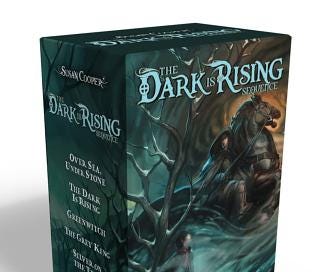The Dark is Rising: Fantasy
Arthurian legend is at the heart of one of the most underrated series ever.
At the end of a work call this week, we took turns sharing what we were happy about, and one colleague talked about a trip to Cornwall, where he has family. Afterward I sent him a message saying that I’ve wanted to visit Cornwall ever since reading and re-reading Susan Cooper’s “The Dark is Rising” series as a child. He responded with astonishment that he’d never heard of it — like too many other people I’ve mentioned it to. So today’s Bookworm is a tribute to one of my favorite series, one that makes me happy every time I read it again.
***
In fourth grade I discovered the fairy tales and folklore section of the library.
I was in a new school that year, an intimidatingly large one. Before that I’d attended a K-3 school in an intimate one-story building. Now I was at a K-8 school that rose three stories high and was filled with strangers. We lived close enough to my old school for me to walk with other neighborhood kids; when I transferred to this farther-away school, we learned that the school would not provide transportation. I ended up riding a city bus, which I could board in the morning right in front of my house, but which dropped me in the afternoon across the street, with four lanes of urban traffic in between. I got very good at darting across two lanes to the center refuge lane, then dashing across the remaining two lanes the moment I saw a break in the vehicles whizzing by.
The school library became a retreat, a place to escape my new circumstances — and how better to do so than through fantasy? It was there that I first encountered, among other myths and legends, the story of King Arthur.
***
Through five spellbinding books, “The Dark is Rising” interweaves the stories of two contemporary English families, the Drews and the Stantons, and their mutual acquaintance: Merriman Lyon, a beloved avuncular figure to Simon, Jane and Barney, the Drew siblings, and a mysterious stranger who reveals to Will, the youngest Stanton, his true, otherworldly identity. When the series begins, with the 1965 book “Over Sea, Under Stone,” the Drew children have just arrived in Cornwall at the invitation of the man they call Great-Uncle Merry. Cooper enthrallingly sketches him from the start as someone who has more to him than meets the eye:
Nobody knew very much about Great-Uncle Merry, and nobody ever quite dared to ask. He did not look in the least like his name. He was tall, and straight, with a lot of very thick, wild, white hair. In his grim brown face the nose curved fiercely, like a bent bow, and the eyes were deep-set and dark.
How old he was, nobody knew. “Old as the hills,” Father said, and they felt, deep down, that this was probably right. There was something about Great-Uncle Merry that was like the hills, or the sea, or the sky; something ancient, but without age or end.
Cooper employs storytelling tropes expertly: A rainy day during which three bored children start exploring a mysterious old house. A careless action that turns up an odd and obviously very old object. A pair of strangers who seem a little too eager to make the family’s acquaintance. An unusual burglary that makes no sense to the local authorities. And that’s just in the first five chapters of “Over Sea, Under Stone.” Over the course of the series, Cooper also brings in Celtic lore, Welsh storytelling traditions and her own unique take on Arthurian legend.
***
I’ve read other wonderful reimaginings of the King Arthur canon: One of my high school English teachers assigned T.H. White’s “The Once and Future King,” while another had us read Marion Zimmer Bradley’s “The Mists of Avalon.” I’ve seen “Monty Python and the Holy Grail” and its musical spinoff “Spamalot.”
White traces one man’s lifelong journey to knowledge and power. Bradley brings the previously marginalized women behind the throne front and center. Monty Python skewers the lore and the reverence in which it’s held. I like all of their work very much. But it’s Cooper’s series that I keep returning to, because it’s the one that manages to contain both an epic saga and an intimate story about family. And, decades before a certain young wizard appeared on the literary scene, it gave tremendous agency to can-be-seen-but-must-not-be-heard children.
The Drew children must work together to solve the mysteries they stumble across, and they do so with genuine affection for one another. Will must come of age and into his destined self alone, but he does so bolstered by the love and support of his parents and siblings. Eventually, magically, they all find their fates intertwined with that of Arthur and his family, who have become central to the battle between the forces of good and evil, the Light and the Dark. Cooper makes it literal: Without those who bring light into our lives, we are lost in the dark.




I believe my grandson, now 14, has read this series. Or much of it, so I'm very glad to know more about it. The Once and Future King was the Arthurian legend that grabbed me when I was a kid; by 1967 when this series was issued I wasn't reading much fantasy, except for Ursula Le Guin's, who wrote about a certain other wizard, named Ged. Thanks for the enlightenment and maybe I'll have a look!